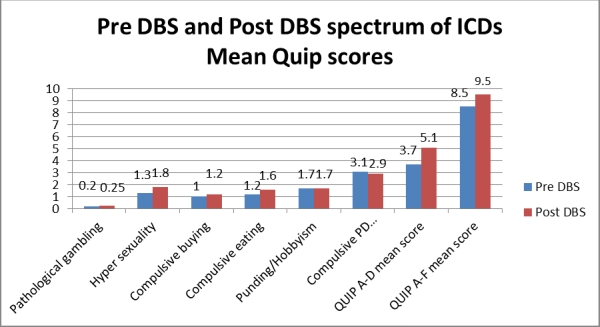Session Information
Date: Monday, June 20, 2016
Session Title: Surgical therapy: Parkinson's disease
Session Time: 12:30pm-2:00pm
Location: Exhibit Hall located in Hall B, Level 2
Objective: To study the effects of bilateral subthalamic nuclei stimulation on impulse control disorders(ICDs) in Parkinson’s disease (PD).
Background: Impulse control disorders(ICDs) cause significant morbidity to patients with Parkinson’s disease. The effect of bilateral subthalamic DBS on PD are unclear. Reduction of dopaminergic agonists post DBS can reduced ICDs, however denovo ICDs have arisen after STN-DBS.
Methods: It is a longitudinal follow up study. 20 PD patients diagnosed as per UKPD brain bank criteria and who underwent bilateral STN DBS were studied prior to and 6 months after DBS surgery. All patients fulfilled CAPSIT-PD criteria (disease duration>5 yrs, UPDRS III score in ‘off’>30, good response to levodopa, normal cognition (Montreal cognitive assessment score >26), Hoehn and Yahr score <4) and were operated by a qualified neurosurgeon using stereotactic imaging guidance, microelectrode recording and on table stimulation. Post operatively MRI brain were used to confirm location of DBS electrodes and stimulation was started with 130 Hz frequency, 60 microsecond pulse width and a constant voltage atleast 1 month prior to assessment with optimized medication. Dopaminergic agonists dosage was kept relatively constant. ICDs were assessed using Questionnaire for impulsive-compulsive disorders in Parkinson’s disease rating scale (QUIP-RS).
Results: 20 patients, out of which 10 were women,were included with mean age of 54.1 ± 9.14 years, mean disease duration of 7.65 ± 2.8 years with mean levodopa equivalent dose of 655mg ± 190 mg. Mean dopamine dose was similar pre and post DBS.ICDs were noted in 11 patients (55%) before DBS which increased to 13 (65%) patients after surgery. One patient totally improved while 3 patients developed ICDs after surgery. There was an increase in mean QUIP-RS (A-F), mean A-D scores, mean scores for hyper sexuality, compulsive eating and buying although it was not statistically significant.  In seven patients (35%) there was decrease in QUIP score after DBS25%).
In seven patients (35%) there was decrease in QUIP score after DBS25%).
Conclusions: There is variation in the response to ICDs after STN-DBS. STN-DBS by itself may improve or worsen ICDs and may improve ICDs by decreasing levodopa and dopamine agonist dose.
To cite this abstract in AMA style:
R. Borgohain, P.K. Pesala, R.K. Mridula, A.K. Puligopu, V.V.P. Kagita, S.A. Jabeen, M.A. Kanikannan. Effect of bilateral subthalamic nuclei deep brain stimulation on impulse control disorders in PD [abstract]. Mov Disord. 2016; 31 (suppl 2). https://www.mdsabstracts.org/abstract/effect-of-bilateral-subthalamic-nuclei-deep-brain-stimulation-on-impulse-control-disorders-in-pd/. Accessed April 21, 2025.« Back to 2016 International Congress
MDS Abstracts - https://www.mdsabstracts.org/abstract/effect-of-bilateral-subthalamic-nuclei-deep-brain-stimulation-on-impulse-control-disorders-in-pd/
